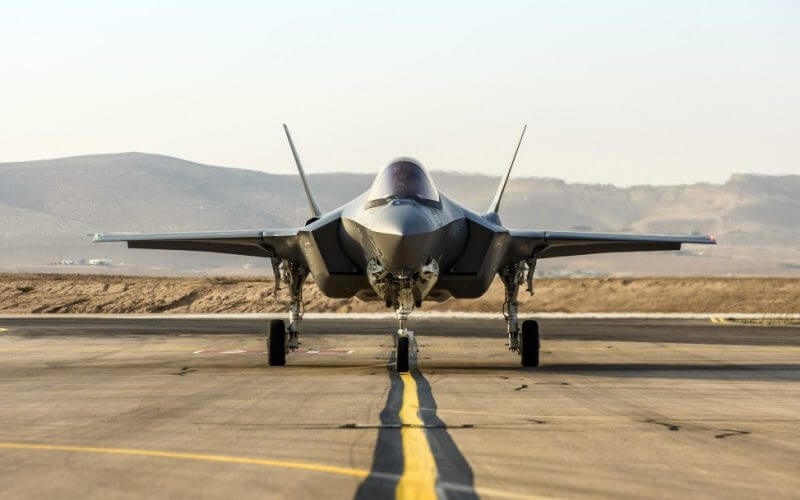As tensions continue to mount between Israel and the Islamic Republic of Iran, the Jerusalem Post over the weekend revealed the type of military plane that could strike Tehran's nuclear facilities should Israel decide to take action against the regime's nuclear program.
According to reports, the type of military plane Israel has obtained in recent decades, thanks to help from the United States, is the F-35, a small yet powerful fighter craft. According to IDF officials, F-35s are made small and carry fewer weapons, allowing them to have a lower radar signature and achieve a surprise stealth attack.
Israel and the U.S. have engaged in military training operations in the Middle East, with several Israeli F-35 fighters launching from the Beersheba Air Force base alongside American F-15s.
Speaking to Air & Forces Magazine, IDF Lieutenant Colonel "M," commander of the 140 F-35 squadron, explained that his unit could be in the air during the exercise in less than 10 minutes. On refueling, the IDF official declined to address specific targets like Iran but explained that his unit would be ready for "all tasks," sending a message that Israeli forces have solutions for long-range flights.
During the most recent aerial exercise, the IDF Lieutenant explained that America is a huge asset and backer and that any help from Israel's number one ally "could be good" if a foreign strike were to occur.
In late January of this year, the U.S. Central Command (CENTCOM) took part in one of the largest American-Israeli joint exercises in history, sending a message to Iran and its terrorist proxies that America and Israel stand ready against any threat.
The official did note that Israeli forces are prepared to take action against foreign threats if allies like the U.S. sat on the sidelines.
Following Israel's acquisition of the F-35 military fighters, officials have trained pilots capable of handling such powerful aircraft, with pilots learning operational maneuvers and being able to fly in various formations, teaching American military pilots some new moves. Israeli pilots have also been told to improve their English skills to prevent any discrepancies in communication with American Air Forces.
Experts familiar with Israel's aerial capabilities believe that the IDF could use a refueling plane to refuel its fighters, or the fighters could land and refuel at friendly Gulf Arab states like Saudi Arabia. While Israeli officials did not give detail on specific tactics, officials have assured the public that they are ready for any defensive scenario.
Following Israel's successful strike against Saddam Hussein's nuclear attack in 1981 and the strike on the Assad regime's atomic reactor, Israeli officials have tried to improve their aerial capabilities against threats like Iran and its ongoing nuclear program.
According to experts, the most complex element should Israel attempt to destroy Iran's underground nuclear facilities would be its underground Fordow facility.
American Presidents have refused to provide the Israeli government with "bunker buster" weapons designed to destroy such deep underground facilities.
In Washington, officials have called on the U.S. government to provide bunker-busting weaponry to deter Iran's nuclear production. Even if Israel obtained such weaponry, experts note that no Israeli aircraft can carry the weight of a large bunker-buster bombing.
Despite these problems, Israeli officials are working hard to resolve them, looking at potential malfunction and any other challenges that may arise.
Following the freeze between American and Iranian officials over reviving the 2015 nuclear program and Prime Minister Netanyahu's election last year, American and Israeli officials have been more open about how a strike against Iran's nuclear facilities would occur.
At a previous graduation ceremony for new Israeli Air Force personnel, the then-defense minister Benny Gantz told graduates they would need to be ready to attack the Islamic Republic of Iran soon. Since Gantz's statements, many other Israeli officials like the new IDF Chief of Staff Herzi Halevi, Defense Minister Yoav Gallant, and Likud Prime Minister Benjamin (Bibi) Netanyahu have made direct threats against Tehran and its nuclear program, vowing to stop it with any means necessary.
Related Story: Israel and US Air Forces Conduct Joint Drills in Signal to Iran










